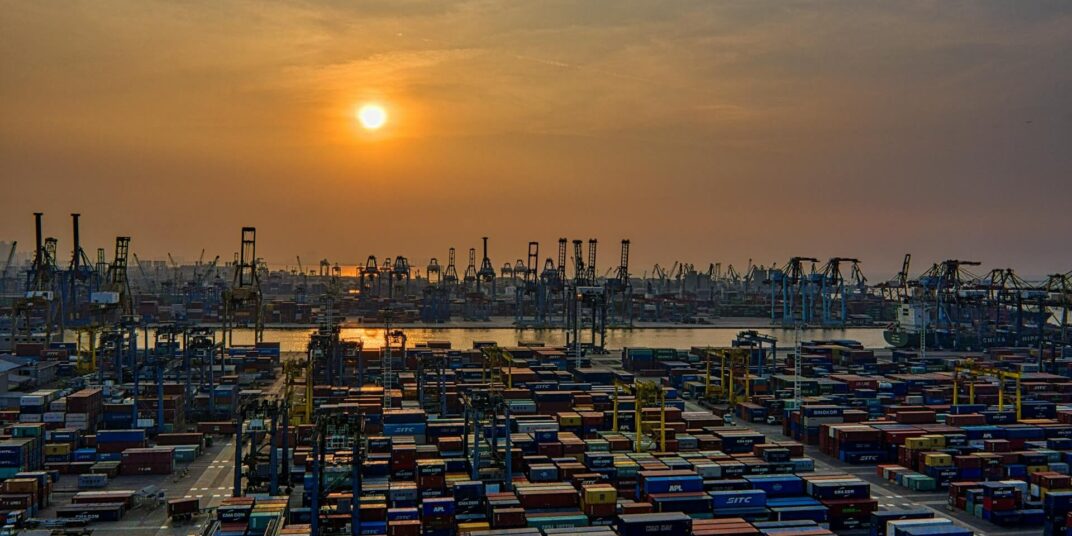Sustainability in logistics is a complex beast, given the broad range of tasks that go into moving products around the globe. Key stops along the logistics supply chain include fleet management, warehousing, packaging, and distribution, among others.
Industry-wide change can only happen through sustained activism and grassroots pressure on the executives and shareholders who drive decisions across the sector. However, startups pioneering new approaches and inventions are key to this green transition too.
Here, we’ve checked in with some of 2025’s most fascinating startups, each of which drills down on a specific sustainability approach, small or large. Read on for the most exciting startups helping to guide the logistics business towards sustainable practices.
Startups Bringing Sustainability to Logistics
We’ve highlighted three startups that illustrate the biggest ways that sustainability can be addressed with new business models.
First, you can identify inefficiencies within a specific industry, like Woodchuck was able to do with industrial wood processing. Next, you can pioneer a new product model entirely, as PulpaTronics is doing with its new paper version of previously metal trackers. Finally, you can create software that iterates on best practices to optimize them, refine them, and make them even better, like Grasshopper Labs.
The startups:
1. WoodChuck: Reducing processing waste in logistics
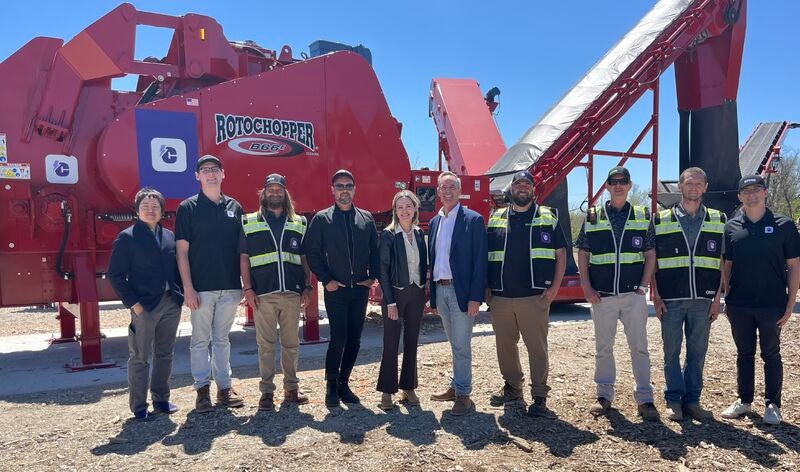
- Founder: Todd Thomas
- Core mission: To build a sustainable biomass supply chain, and transform wood waste into valuable resources
When a severe ice storm hit northern Michigan early this year, one startup mobilized within days to set up four wood processing sites. Thousands of trees had been knocked down, so the wood debris needed to be cleared. Thanks to the WoodChuck startup, it didn’t need to go to waste.
WoodChuck relies on AI-powered image recognition at processing sites with the goal of identifying and sorting different types of wood and composite waste. If it passes this test, debris that would otherwise be headed into a landfill will get a second life as high-quality biomass fuel for manufacturers, utilities, and bioenergy facilities.
By teaming up with logistics providers, contractors, and municipalities, the company serves as an end-to-end network for wood waste diversion, diverting over 60% of incoming wood waste from landfills. The company’s grading even results in 50% of their output hitting Tier 1 biomass quality standards — meaning that premium buyers like manufacturing facilities can use the clean fuel without any additional processing.
As Michigan’s ice storm response proves, the company even helps with disaster recovery. We really don’t have any complaints here.
“Until now, there simply wasn’t a viable logistics system to move and process wood waste at scale. WoodChuck is building that system—powered by AI, clean energy, and a boots-on-the-ground mentality.” the company’s PR rep explains.
Everyone creates waste of one kind or another, so startups around the globe can get their feet in their respective doors. The India-based Gofig is an organized platform for reducing waste from surplus and short-dated Fast-Moving Consumer Goods like food or beverages, while the Spoiler Alert works within the same business, but delivering software solutions and operating from its home in Boston.
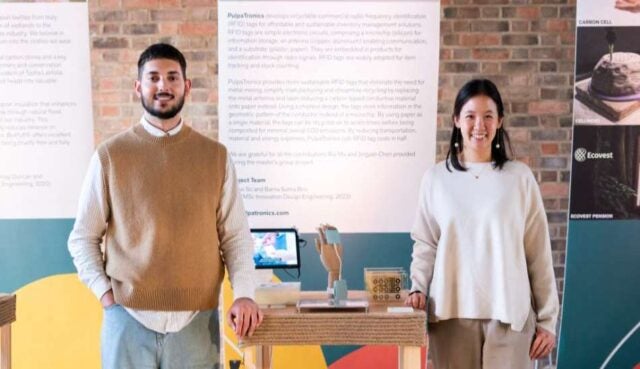
- Founders: Chloe So and Barna Soma Biro
- Core mission: To end single-use electronic waste with chipless paper-based RFID tags
One truly innovative startup in logistics sustainability? PulpaTronics and its chip-free, paper-only iteration of an RFID tag (radio frequency identification), the electronic widget that clothing stores or inventory managers rely on to track their assets.
If you find the idea of an electronic tracker that doesn’t use a metal antenna tough to grasp, you’re not alone. Here’s how co-founder and CEO Chloe So explained it to me:
“We use our lasers to induce a conductive circuit from our substrate material. We’re essentially turning the carbon that exists in paper into a more conductive material that’s closer to graphite/graphene. By doing that, we eliminate the need for metal antennas.”
The company first emerged as a master’s project within a dual-degree program between Imperial College London and the Royal College of Art called Innovation Design Engineering.
The company will be conducting its initial pilots later this year, and in 2025 alone, PulpaTronics won the Connected Packaging Award and Startup of the Year at the Packaging Startup Awards, won Vueling’s NextGen Aviation Challenge, and hit the Forbes 30 under 30 list within the Manufacturing and Industry Category.
There’s plenty of single-use electronic waste to reduce: Right now, 30 billion single-use tags end up in landfills yearly, with 12 billion produced for the fashion industry alone.
3. Grasshopper Labs: Optimizing for efficiency through software
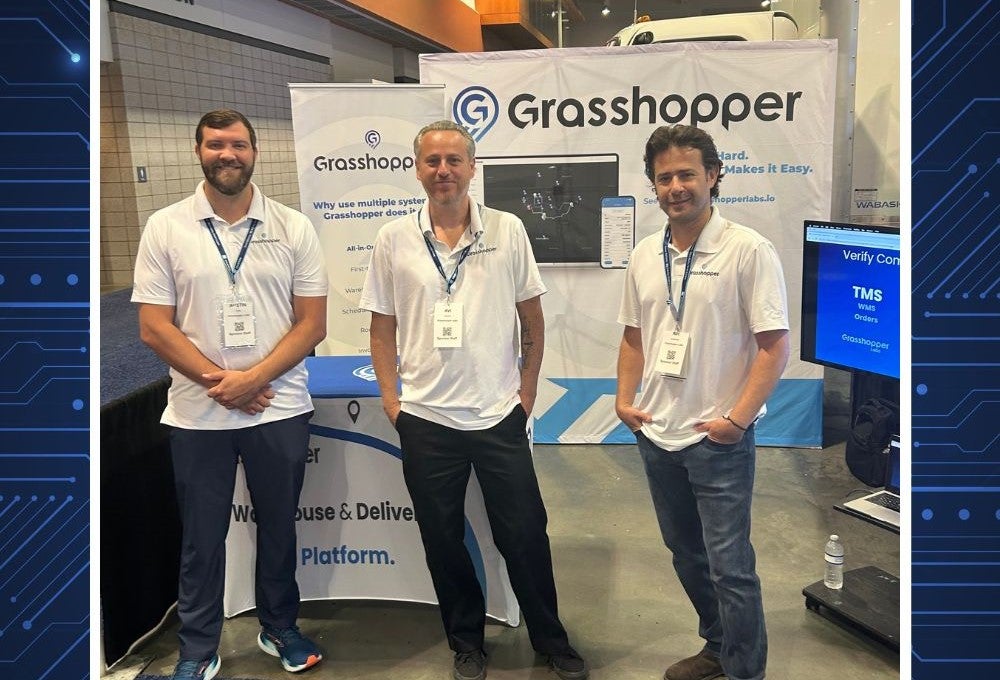
- Founder: Ori Anavim
- Core mission: To streamline the traditional delivery process and help customers unlock new efficiencies
Other startups are building software for stopping other inefficiencies in their tracks, too. Grasshopper Labs provides logistics visibility to retailers, e-commerce sites, and delivery companies by optimizing for customer preferences in addition to delivery routes.
The core sustainability benefit here comes entirely from new processes, guided by the right software advancements. These changes include the reduction of redundant routes and the carbon emissions that go with them.
“By working in an actual warehouse, we developed technology that is easy to implement and incredibly powerful, boosting throughput by up to 100%. Increased efficiency means fewer hours worked per shipment handled and more revenue per hour” – Ori Anavim, founder at Grasshopper Labs.
Anavim also notes that the company’s clients have been able to increase delivery volumes on some routes by between 10% and 20%, allowing them to reduce driving while maintaining their quotas. It’s an example of how sustainability doesn’t have to look like adding something new: Sometimes it’s a case of refinding your current approach to tighten it up.
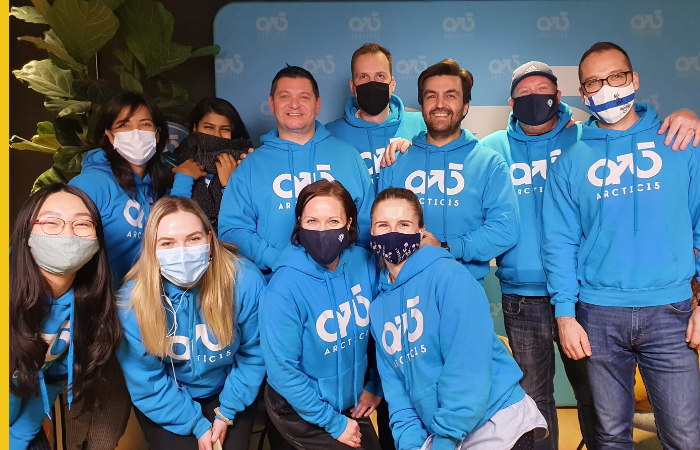
- Founders: Hannah Seiber and Mark Langer
- Core mission: To modernize cold chain logistics and reduce emissions, with reusable cooling containers
The logistics sector is responsible for transporting a wide range sensitive goods, from food to medicine, and keeping them temperature controlled is no easy feat. The real issue; while routes are able to be optimized through the use of fleet management software, most cold chain logistics companies rely on refrigerants to cool goods, which contribute significantly to global warming.
Artyc is aiming to address this problem by creating products with refrigerant-free, thermoelectric cooling technology. Their active cooling containers, which provide real-time-tracking and temperature control, are supporting their ultimate aim of decarbonizing cold chain logistics.
Despite only being found in 2021, the startup is already making a splash. Artyc raised a total of $10.7 million over three funding rounds, and have developed patents for multiple smart containers, including the the Medstow 5L and Medstow Mini, which are designed for the transportation of medical goods and biologics.
Artyc was even named a Technology Pioneer by the World Economic Forum, an accolade recognizes the huge strides company are taking in the field of sustainable logistics.
5. Workhorse: Slashing last-mile delivery emissions with electric vehicles
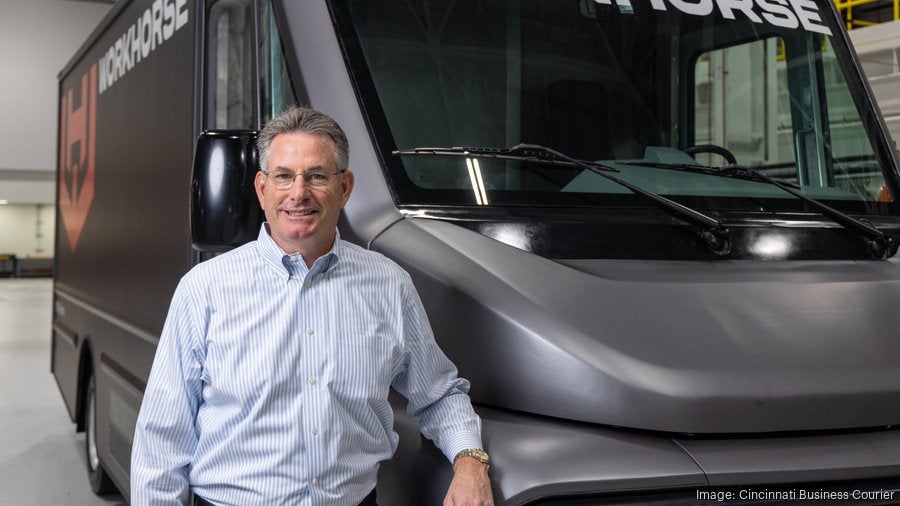
- Founders: Stephen Burns
- Core mission: To pioneer the transition of to zero-emission vehicles for last-mile delivery
Driven by the demand for fast, or even same day delivery, the final leg of the ecommerce supply chain has a disproportionate impact on the environment, despite being the shortest part of the delivery journey.
Workhorse Group is working hard to lower the emissions from last-mile delivery fleets by manufacturing electric vehicles with zero tailpipe emissions. The startup’s W5G vans, which boast state-of-the-art features like improve driver ergonomics and regenerative breaking, have shown to make a considerable impact, with just 15 of these vehicles avoiding an estimated 607 metric tons of talepipe emissions annually.
Workhorse Group’s has already hit the ground running by securing major partners. Notably, the startup has deployed fully-electric trucks to major transportation companies like FedEx, supporting them in their mission to become carbon-neutral by 2040.
How Route Optimization Slashes Carbon Emissions for Trucks
When the lay person thinks of logistics, they likely picture trucks barrelling across the country or ships piled high with containers. And they’d be right.
Transportation is a huge part of the business, and it’s easy to see why sustainability is a big concern here: Carbon emissions from all those trucks and ships are an unavoidable element. International shipping contributed to 3% of greenhouse gas emissions worldwide in 2022, and the entire transportation sector is the second-biggest contributor to global carbon emissions, adding 20.2% of all emissions yearly.
One big way to keep the environmental impact low is to reduce the damage done by emissions. Upgrading to an EV fleet can help when it comes to transportation, as can route optimization and carbon offsetting. Other steps in the process can be made more environmentally friendly as well, thanks to biodegradable packaging and recycling programs.
Naturally, startups are helping craft the best optimization software, and with good results, according to Allan Hou, Sales Director at the logistics company TSL Australia. Hou’s two decades of experience in the business have put him in contact with startups like a firm designing software to respond to real-time data on weather and traffic trends in order to surface the optimal fuel-saving routes at any given time. The result: Fuel wastage is down 15%, reducing emissions.
Better predictive maintenance
Our Moving Goods With Fewer Hands report found that 57% of logistic companies are have changed their operational model due to technology. A big way that trucking businesses are leveraging technology is through data-driven predictive maintenance.
The right machine learning program can anticipate potential failures before they happen, avoiding the cost of unnecessary repair. Granted, Hou sees the value of these startups as delivering monetary value to businesses just as much as helping the environment.
“What is interesting in these startup companies is that they are undertaking customary environmental activities and finding smarter and more sustainable means of operating in the logistics industry. The innovations are more subtle yet impactful, creating long-term value without sacrificing operational efficiency,” says Hou.
Valuing safety while boosting efficiency
Smart Access is an SOP (Standard Operating Procedure) execution platform that aims to boost safety by ensuring frontline workers in distribution centers follow best practices and standard procedures. Better analysis of floor-level analytics can guide operations leaders to the behaviors that may be driving delays, safety risks, or unneeded waste. Smart Access reports a 64% improvement in worker retention within 180 days, alongside a reduction in warehouse execution errors of up to 40%.
The Future of Logistics Sustainability
Even amid a looming recession and tariff-driven economic uncertainty, some sustainability startups are still raking in impressive funding rounds.
Take Recycle Track Systems (RTS), for example. RTS incorporates AI into the recycling and waste disposal industry with innovations including smart waste sensors, reverse vending machines for recycling, and more efficient waste pick-ups to promote a circular economy, and it just closed a $40 million funding round in January 2025 — putting it among the highest funded NYC startups that month.
Other startups are addressing sustainability across broader markets than just logistics. EcoSend, which bills itself as “the climate-conscious email marketing platform,” is committed to offsetting email campaign emissions. Yes, they exist: Processing, sending, receiving, and storing an email takes energy, after all, and EcoSend puts the cost at 26g of CO₂ emissions per email sent.
Interested in finding a job at your own climate-centric startup? Outside of logistics, you’ll find even more startups with similar goals. Climate agtech, fully-renewable electric grids, and solar panel installations are just a few of the growth areas that are hiring now on climate-focused job boards like Climatebase or Impakt.
Why Sustainability Needs Startups
Writer Douglas Adams invented the concept of the SEP in the early ’80s. That’s an acronym for “Somebody Else’s Problem,” and it refers to the blind spot that people evolve for anything that they think they’re not personally responsible for. At many sprawling, well-established corporatations, typical sustainability issues will always seem like someone else’s problem.
That’s why small, scrappy startups are so important. They come with great flexibility, speedy turnaround times, and the vision to tackle a problem instead of passing the buck. So, it’s no wonder that they’re the best business models for identifying and addressing business energy wastes that might fly under the radar everywhere else.
Here’s hoping we keep seeing new crops of sustainability startups long into the future. One thing’s for sure: We won’t run out of problems to tackle.
